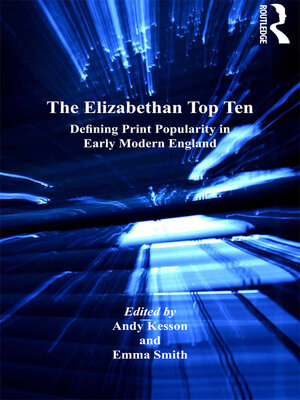The Elizabethan Top Ten
ebook ∣ Defining Print Popularity in Early Modern England · Material Readings in Early Modern Culture
By Emma Smith

Sign up to save your library
With an OverDrive account, you can save your favorite libraries for at-a-glance information about availability. Find out more about OverDrive accounts.
Find this title in Libby, the library reading app by OverDrive.



Search for a digital library with this title
Title found at these libraries:
| Library Name | Distance |
|---|---|
| Loading... |
Engaging with histories of the book and of reading, as well as with studies of material culture, this volume explores 'popularity' in early modern English writings. Is 'popular' best described as a theoretical or an empirical category in this period? How can we account for the gap between modern canonicity and early modern print popularity? How might we weight the evidence of popularity from citations, serial editions, print runs, reworkings, or extant copies? Is something that sells a lot always popular, even where the readership for print is only a small proportion of the population, or does popular need to carry something of its etymological sense of the public, the people? Four initial chapters sketch out the conceptual and evidential issues, while the second part of the book consists of ten short chapters-a 'hit parade'- in which eminent scholars take a genre or a single exemplar - play, romance, sermon, or almanac, among other categories-as a means to articulate more general issues. Throughout, the aim is to unpack and interrogate assumptions about the popular, and to decentre canonical narratives about, for example, the sermons of Donne or Andrewes over Smith, or the plays of Shakespeare over Mucedorus. Revisiting Elizabethan literary culture through the lenses of popularity, this collection allows us to view the subject from an unfamiliar angle-in which almanacs are more popular than sonnets and proclamations more numerous than plays, and in which authors familiar to us are displaced by names now often forgotten.







